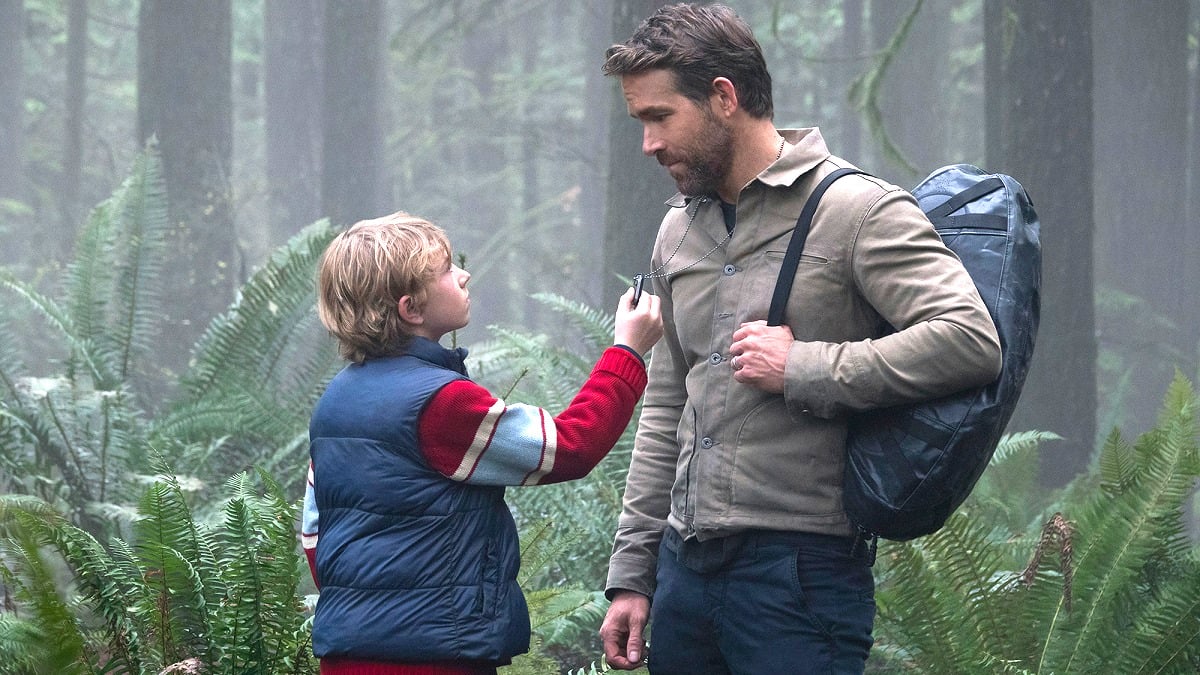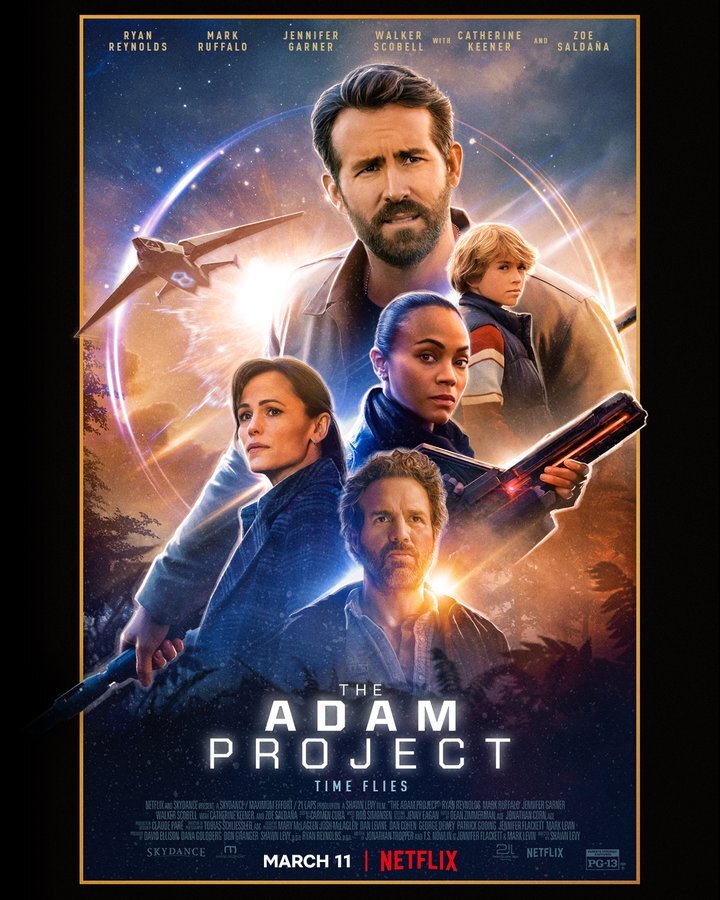Hugh Jackman already had a reputation as one of the most likeable stars in Hollywood, but one of the greatest gifts he’s given audiences since hanging up the claws of Wolverine is putting Shawn Levy and Ryan Reynolds into each other’s orbit.
The longtime Logan worked with the filmmaker on cult classic Real Steel, and his long-running friendly feud with his X-Men Origins: Wolverine co-star needs no introduction. Levy was best known as the director of commercially successful but routinely formulaic blockbusters, while Reynolds relied a little too heavily on his established screen persona to essentially play slight variations on the same character over and over again.
Last year’s Free Guy was a whip-smart, fun, and fresh spin on the video game genre that turned out to be one of the best original movies to come out of the studio system for a hot minute, and they’ve only gone and done it again with The Adam Project. Sure, Netflix’s latest high-profile original does occasionally lean into the most overused tendencies of its director and leading man, but when the story remains focused on family above all else, it’s an absolute delight.
If you’ve grown weary of Reynolds’ motor-mouthed shtick, then the first act of the time traveling sci-fi may not go down all that well. In fact, you get twice as much wry sarcasm and quick-witted quipping for your troubles, with newcomer Walker Scobell admittedly doing an excellent job of matching the Deadpool star’s mannerisms and cadence.
Levy has cited countless Amblin classics and 1980s benchmarks as his inspirations, and it turns out he was talking literally. The Adam Project is one of the better big budget Netflix blockbusters of recent times, but it’s never too far away from reminding you of another (and superior) title, whether it be Back to the Future, The Goonies, E.T., or Big.
That’s not necessarily a bad thing, when the Spielbergian trappings perfectly suit the style and tone of the piece, which kicks off with a bang via an energetic intergalactic dogfight. Reynolds’ Adam Reed is on the run from his employers, and after escaping thanks to some temporal trickery, he finds himself forced to seek refuge at his own childhood home.
Scobell’s younger version of the title character is still bristling from the loss of his father, and often lets his big mouth cash checks his ass definitely can’t cash, which puts his poor mother in an unfortunate position. Once the two Adams meet, the narrative immediately begins to up the pace, and there’s never too long to wait until the next slam-bang action sequence comes along.
There are car chases, dogfights, explosions, scenes of hand-to-hand combat, and some nifty effects work that allows Adam the elder to wield a weapon (that is most definitely not a lightsaber) to dispatch his enemies in psychedelically eye-popping fashion, but it’s little more than window dressing in the grand scheme of things.
As a big budget movie hailing from the world’s biggest streaming service with an A-list name front and center, The Adam Project is inevitably obligated to deliver plenty of spectacle, but it’s never better than when the focus is narrowed as tight as possible, and boiled down to the very essence of family.
Reynolds almost resents Scobell for the way he treats his mother, because he knows how much it affected him in the long run. When he encounters Jennifer Garner’s Ellie at a bar and they have a heart-to-heart that’s completely unknowing and unwitting on her part, the emotions are palpable. On a macro level, this single scene is comfortably the best dramatic work we’ve seen from Reynolds in roughly a decade, and it’s something we’d love to see more often.
Similarly, all of The Adam Project‘s key players have touted it as a father/son story above all else, and that’s exactly when Levy’s latest is strongest. And, considering that nobody in the business gives off anywhere near as much wholesome dad energy as Mark Ruffalo, his casting was an inspired call.
He’s as warm, kind, and funny as you’d expect, using the twinkle in his eye and weary charisma to deftly dovetail between exposition and emotion, often in the space of a single scene, while talking to both Adams. However, a couple of major cogs in the machine fall flatter than expected.
One of the recurring gags is that nobody seems to have a clue how the time travel works, which is a fairly self-aware method dealing with the questions that arise, but acknowledging them only invites further scrutiny and highlights the structural problems that often rear up.
People love to break down the mechanics of the central conceit, but having the characters cracking jokes and yelling “it’s classified/complicated” over and over again makes it seem as though Levy and the writers know viewers will have questions, but they’re telling you not to care.
That’s fine in microcosm, but it keeps the universe painted in much broader strokes than the figures who inhabit it, which can be a jarring juxtaposition when the world-building hints that it has the answers you’re looking for, it just doesn’t want to let you know what they are.
The weakest part of The Adam Project, and it’s not even close, is Katherine Keener’s villainous Maya Sorian. The two-time Academy Award nominee is a phenomenal actress, but she’s nothing more than a cipher here. Her entire arc is that of ‘exposition-driven plot device who exists solely to provide one-dimensional opposition’, and we won’t even go into the awful de-aging technology used to have her share several scenes with her dead-eyed younger self.
Zoe Saldaña almost falls into a similar trap as the erstwhile love interest, but she generates real chemistry with Reynolds, and is reliably solid when it comes to kicking ass. Her contributions don’t require much else than joining the dots in the overstuffed second act (which does yield a heartstrings-tugging payoff later on), but her Laura still manages to leave a mark.
The crux of the main character is that Reynolds’ Adam finds himself inadvertently warning (and by extension, inspiring) Scobell to avoid becoming the man he’d already become, and the best way to start is by reconnecting with the mother he’s deliberately pushing away.
The best and worst tendencies of each Adam are hoping to meet in the middle, bringing about the ideal version somewhere down the line in a reset future, where he casts aside his doubts and weaknesses in order to maximize every aspect of his own existence, which is existential as hell for a PG-13 family film.
Similarly, when two generational iterations of Ruffalo’s son appear to him in the past, he doesn’t seem flustered in the slightest. Instead, he urges them to make the most of what they’ve got and what he’s given them, because he doesn’t want to change the future by altering the past. He knows that his death needs to happen, but he’s trying to teach them an important lesson along the way about life, which they can’t learn unless he dies.
It’s fairly heavy stuff for what’s ostensibly an all-ages romp that relies heavily on the archetypes of both the action comedy and the time travel setup, but it works. It isn’t always entirely successful, but when The Adam Project is firing on all cylinders and zeroing in on the family drama that’s never too far away from the surface, you may just find yourself fighting back tears.
Good
'The Adam Project' occasionally falls into formula, but Netflix's time travel movie is significantly elevated by strong performances and a surprisingly emotional core.







